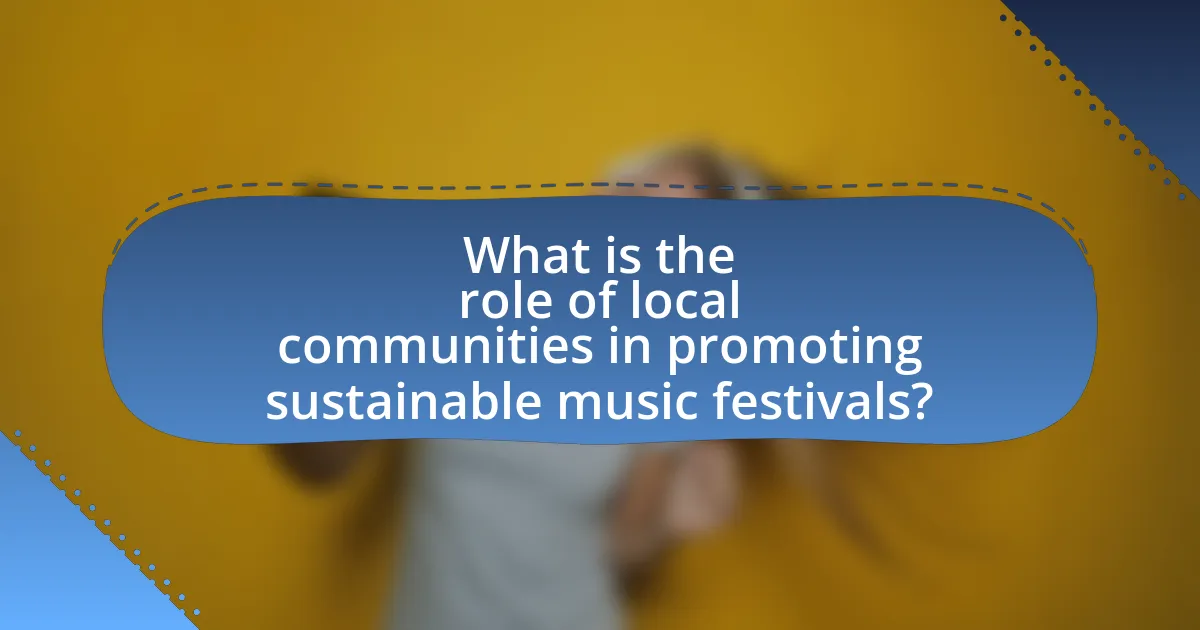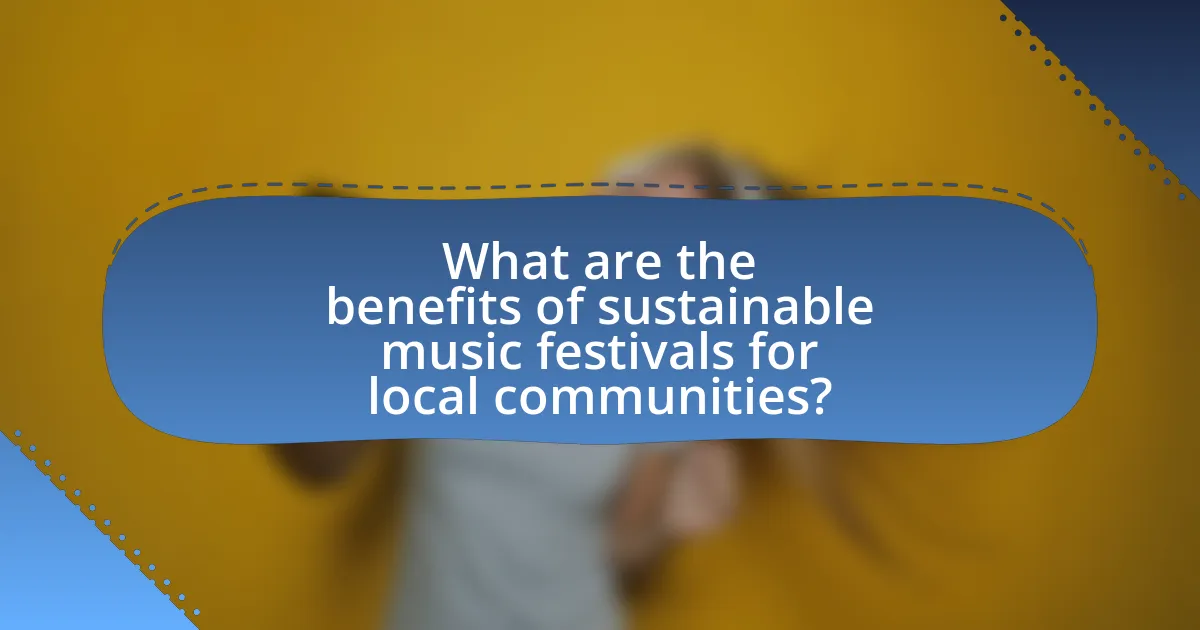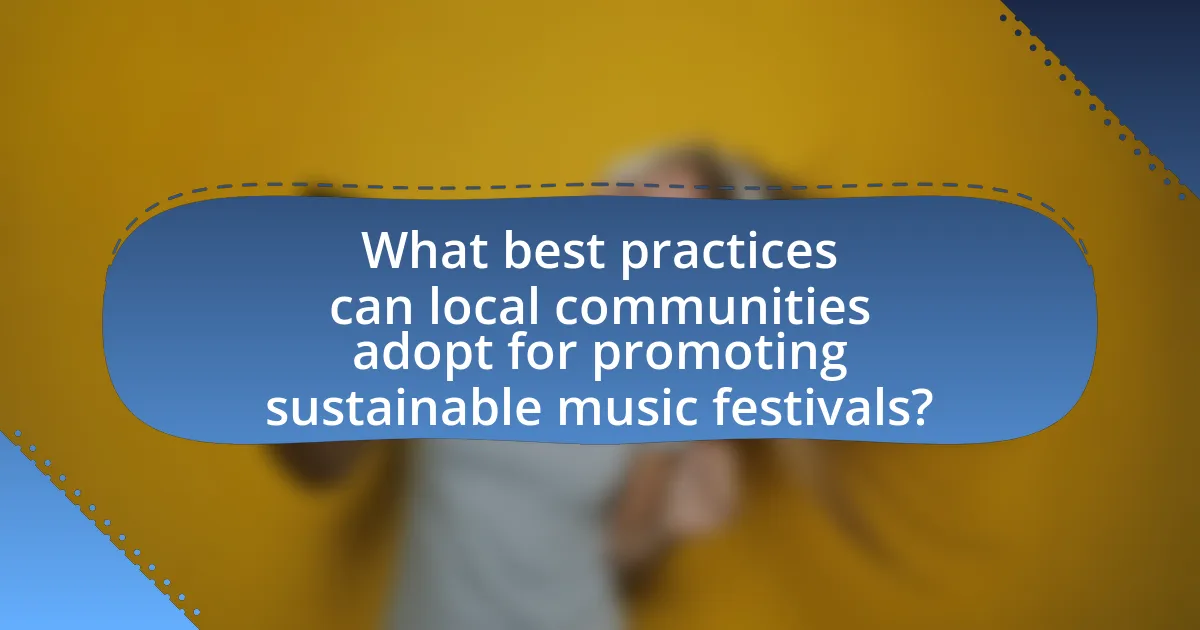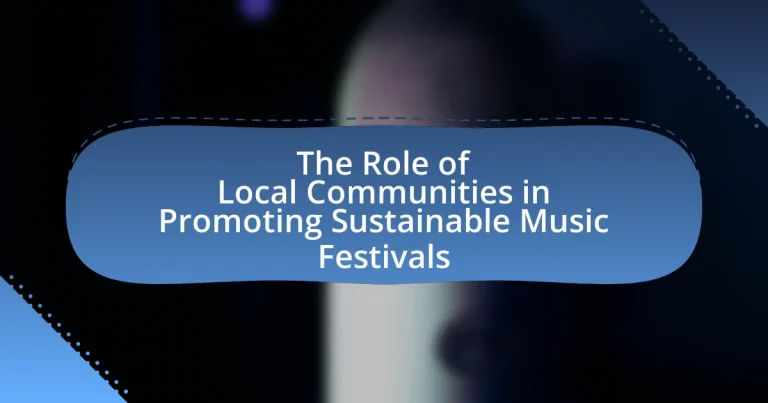The article focuses on the critical role of local communities in promoting sustainable music festivals. It outlines how community engagement in planning and organizing these events leads to eco-friendly practices such as waste reduction, local sourcing, and educational initiatives on sustainability. The article discusses specific actions taken by communities, the influence of local values on festival practices, and the economic and social benefits derived from sustainable festivals. Additionally, it addresses challenges faced by communities in promoting sustainability and offers strategies for enhancing community involvement and collaboration with festival organizers.

What is the role of local communities in promoting sustainable music festivals?
Local communities play a crucial role in promoting sustainable music festivals by actively engaging in planning, organizing, and implementing eco-friendly practices. Their involvement ensures that local cultural values and environmental concerns are prioritized, leading to initiatives such as waste reduction, local sourcing of materials, and community education on sustainability. For instance, festivals like Glastonbury have seen local volunteers contribute to recycling efforts, resulting in a reported 50% reduction in waste. This community-driven approach not only enhances the festival’s sustainability but also fosters a sense of ownership and pride among residents, ultimately leading to more successful and environmentally responsible events.
How do local communities contribute to the sustainability of music festivals?
Local communities contribute to the sustainability of music festivals by providing essential support through volunteer efforts, local resources, and cultural engagement. Volunteers from the community help reduce operational costs and enhance the festival experience, while local businesses supply goods and services, promoting economic sustainability. Additionally, community involvement fosters a sense of ownership and responsibility towards environmental practices, as seen in festivals that implement recycling and waste reduction initiatives driven by local residents. Studies indicate that festivals with strong community ties often achieve higher sustainability ratings, demonstrating the effectiveness of local engagement in promoting eco-friendly practices.
What specific actions do local communities take to promote sustainability?
Local communities promote sustainability through initiatives such as organizing recycling programs, implementing community gardens, and hosting educational workshops on sustainable practices. For instance, many communities establish recycling programs that significantly reduce waste; a study by the Environmental Protection Agency indicates that recycling can reduce landfill waste by up to 75%. Additionally, community gardens not only provide fresh produce but also enhance local biodiversity and foster community engagement. Educational workshops often cover topics like energy conservation and sustainable agriculture, empowering residents with knowledge to adopt eco-friendly practices. These actions collectively contribute to a more sustainable environment and community resilience.
How do community values influence sustainable practices at music festivals?
Community values significantly influence sustainable practices at music festivals by shaping the expectations and behaviors of attendees and organizers. When a community prioritizes environmental stewardship, social equity, and cultural preservation, these values manifest in festival practices such as waste reduction, local sourcing of food and materials, and inclusive programming. For instance, festivals like Glastonbury have implemented extensive recycling programs and partnerships with local businesses to minimize their ecological footprint, reflecting the community’s commitment to sustainability. This alignment between community values and festival practices not only enhances the festival experience but also fosters a collective responsibility towards environmental and social issues, reinforcing the importance of sustainability in the local context.
Why are local communities essential for the success of sustainable music festivals?
Local communities are essential for the success of sustainable music festivals because they provide the necessary support, resources, and engagement that ensure the festival’s viability and alignment with sustainability goals. Community involvement fosters a sense of ownership and pride, which can lead to increased attendance and participation. For instance, festivals that collaborate with local businesses and organizations often see enhanced local economic benefits, as evidenced by a study from the University of California, which found that local partnerships can increase festival revenue by up to 30%. Additionally, local communities contribute to environmental sustainability by promoting eco-friendly practices, such as waste reduction and resource conservation, which are critical for the long-term success of these events.
What unique resources do local communities provide to music festivals?
Local communities provide unique resources to music festivals, including local knowledge, cultural heritage, and volunteer support. Local knowledge helps in navigating logistical challenges, such as site selection and crowd management, ensuring the festival aligns with community values. Cultural heritage enriches the festival experience by incorporating local music styles, art, and traditions, which can attract a diverse audience and enhance authenticity. Additionally, volunteer support from community members reduces operational costs and fosters a sense of ownership and pride in the event, contributing to its sustainability and success.
How does community engagement enhance the festival experience for attendees?
Community engagement enhances the festival experience for attendees by fostering a sense of belonging and connection to the event. When local communities actively participate in organizing and promoting festivals, attendees benefit from authentic cultural expressions and local traditions, which enrich the overall atmosphere. For instance, research conducted by the University of California found that festivals with strong community involvement reported higher attendee satisfaction and increased likelihood of return visits. This engagement not only creates a vibrant environment but also encourages attendees to interact with local vendors and artists, further deepening their experience and appreciation for the festival’s cultural context.
What challenges do local communities face in promoting sustainable music festivals?
Local communities face several challenges in promoting sustainable music festivals, primarily including limited financial resources, lack of awareness, and regulatory hurdles. Financial constraints often hinder the ability to invest in eco-friendly infrastructure and practices, as many local organizers operate on tight budgets. Additionally, there is frequently a lack of awareness among community members and stakeholders about the benefits of sustainability, which can lead to insufficient support for green initiatives. Regulatory hurdles, such as permits and zoning laws, can complicate the planning process and discourage the implementation of sustainable practices. These challenges collectively impede the successful promotion of sustainable music festivals within local communities.
What are the common obstacles to community involvement in festival planning?
Common obstacles to community involvement in festival planning include lack of awareness, limited resources, and insufficient communication. Lack of awareness often stems from inadequate outreach efforts, which can prevent community members from understanding the festival’s purpose and benefits. Limited resources, such as funding and volunteer availability, can hinder community participation, as individuals may feel they cannot contribute effectively. Insufficient communication between organizers and the community can lead to misunderstandings and disengagement, as community members may not feel their input is valued or needed. These factors collectively impede the ability of local communities to engage meaningfully in the planning and execution of festivals.
How can local communities overcome these challenges to promote sustainability?
Local communities can overcome challenges to promote sustainability by implementing collaborative initiatives that engage residents in eco-friendly practices. For instance, communities can establish local partnerships with businesses and organizations to create recycling programs and promote the use of renewable energy sources during music festivals. Evidence shows that festivals adopting sustainable practices, such as the Green Music Initiative, have successfully reduced waste by up to 50% through community involvement and education. Additionally, local governments can support these efforts by providing resources and incentives for sustainable event planning, further enhancing community engagement and commitment to sustainability.
How can local communities collaborate with festival organizers for sustainability?
Local communities can collaborate with festival organizers for sustainability by actively participating in planning and implementing eco-friendly practices. This collaboration can include initiatives such as waste management programs, where community members help sort and recycle materials during the festival, thereby reducing landfill waste. Additionally, local businesses can provide sustainable products and services, such as biodegradable food containers or renewable energy sources, which supports both the festival’s sustainability goals and the local economy. Research indicates that festivals that engage local communities in sustainability efforts can reduce their carbon footprint by up to 30%, demonstrating the effectiveness of such collaborations.
What strategies can be implemented to strengthen community involvement in music festivals?
To strengthen community involvement in music festivals, organizers can implement strategies such as engaging local artists, fostering partnerships with community organizations, and encouraging volunteer participation. Engaging local artists not only showcases regional talent but also creates a sense of ownership among community members, as seen in festivals like the Newport Folk Festival, which features local musicians prominently. Partnerships with community organizations can enhance outreach and resources, exemplified by the collaboration between the New Orleans Jazz & Heritage Festival and local cultural institutions, which promotes local heritage and involvement. Encouraging volunteer participation allows community members to contribute actively, as demonstrated by the success of the Bonnaroo Music and Arts Festival, where volunteers play a crucial role in festival operations, fostering a deeper connection to the event.

What are the benefits of sustainable music festivals for local communities?
Sustainable music festivals provide significant benefits to local communities by promoting economic growth, enhancing social cohesion, and fostering environmental awareness. These festivals often stimulate local economies through increased tourism, as attendees spend money on accommodations, food, and local services. For example, a study by the University of California found that music festivals can generate millions in revenue for host cities, creating jobs and supporting local businesses.
Additionally, sustainable music festivals encourage social interaction and community engagement, bringing together diverse groups of people and fostering a sense of belonging. This social cohesion can lead to stronger community ties and increased volunteerism, as residents often participate in organizing and running these events.
Moreover, these festivals raise awareness about environmental issues, promoting sustainable practices such as waste reduction, recycling, and the use of renewable energy sources. By showcasing these practices, festivals can inspire attendees to adopt similar behaviors in their daily lives, contributing to a more sustainable community overall.
How do sustainable music festivals impact the local economy?
Sustainable music festivals positively impact the local economy by generating revenue through tourism, local business support, and job creation. These festivals attract visitors who spend money on accommodations, food, and local attractions, significantly boosting the income of nearby businesses. For instance, a study by the University of California found that music festivals can contribute over $10 million to local economies, with a substantial portion of that revenue benefiting small businesses. Additionally, sustainable practices often lead to increased community engagement and investment in local infrastructure, further enhancing economic stability.
What economic opportunities arise from hosting sustainable music festivals?
Hosting sustainable music festivals creates economic opportunities such as increased tourism, job creation, and local business support. These festivals attract visitors who spend money on accommodations, food, and entertainment, boosting the local economy. For instance, a study by the University of California found that music festivals can generate millions in revenue for host cities, with attendees spending an average of $1,000 per person. Additionally, sustainable practices often lead to partnerships with local vendors and artisans, fostering community engagement and promoting local products. This symbiotic relationship enhances the economic landscape while encouraging environmentally responsible practices.
How do sustainable practices attract more visitors to the community?
Sustainable practices attract more visitors to the community by enhancing the appeal of local events and fostering a positive image. Communities that implement eco-friendly initiatives, such as waste reduction, renewable energy use, and local sourcing, create a unique experience that resonates with environmentally conscious attendees. For instance, a study by the Green Music Initiative found that festivals prioritizing sustainability saw a 20% increase in attendance compared to those that did not. This increase is attributed to the growing consumer preference for responsible tourism, where visitors actively seek out destinations that align with their values.
What social benefits do local communities gain from sustainable music festivals?
Local communities gain several social benefits from sustainable music festivals, including enhanced community cohesion, increased local engagement, and cultural enrichment. These festivals foster a sense of belonging and unity among residents, as they provide a platform for social interaction and collaboration. For instance, a study by the University of California found that community events, such as music festivals, significantly improve social ties and trust among participants. Additionally, sustainable music festivals often highlight local artists and cultural practices, promoting local heritage and identity, which can lead to increased pride and participation in community activities. Furthermore, these events can stimulate volunteerism, as residents often contribute their time and skills, thereby strengthening community bonds and networks.
How do these festivals foster community pride and identity?
Festivals foster community pride and identity by celebrating local culture, traditions, and shared values. These events create a sense of belonging among residents, as they often showcase local artists, cuisine, and history, reinforcing cultural heritage. For instance, a study by the National Endowment for the Arts found that community festivals significantly enhance social cohesion and local identity by bringing people together in a shared experience. This collective participation not only strengthens community bonds but also instills pride in local achievements and uniqueness, making residents more invested in their community’s future.
What role do music festivals play in promoting cultural exchange within communities?
Music festivals play a significant role in promoting cultural exchange within communities by bringing together diverse groups of people to share and celebrate various musical traditions. These events facilitate interactions among attendees from different cultural backgrounds, fostering understanding and appreciation of each other’s customs and practices. For instance, festivals often feature a lineup of artists representing various genres and cultural heritages, which exposes audiences to new sounds and perspectives. Research indicates that such gatherings can enhance social cohesion and cultural awareness, as evidenced by studies showing increased community engagement and collaboration in areas hosting multicultural festivals.
How do sustainable music festivals contribute to environmental awareness in local communities?
Sustainable music festivals contribute to environmental awareness in local communities by implementing eco-friendly practices that educate attendees about sustainability. These festivals often feature recycling programs, renewable energy sources, and local food vendors, which highlight the importance of reducing waste and supporting local economies. For instance, a study by the University of California found that festivals that adopted sustainable practices saw a 30% increase in attendees’ knowledge about environmental issues. By engaging the community in these initiatives, sustainable music festivals foster a culture of environmental responsibility and inspire local residents to adopt similar practices in their daily lives.
What educational initiatives can be implemented during festivals to promote sustainability?
Educational initiatives that can be implemented during festivals to promote sustainability include workshops on waste management, interactive sessions on renewable energy, and educational booths that provide information on local biodiversity. Workshops on waste management can teach attendees how to reduce, reuse, and recycle materials effectively, which is crucial as festivals often generate significant waste. Interactive sessions on renewable energy can demonstrate the benefits of solar and wind power, showcasing how festivals can utilize these resources. Educational booths can engage festival-goers with information about local flora and fauna, emphasizing the importance of preserving the environment. These initiatives not only raise awareness but also empower attendees to adopt sustainable practices in their daily lives.
How can local communities leverage festivals to advocate for environmental issues?
Local communities can leverage festivals to advocate for environmental issues by integrating sustainability themes into festival programming and activities. By featuring workshops, panels, and performances focused on environmental education, communities can raise awareness about pressing ecological concerns. For instance, festivals can partner with local environmental organizations to provide information on recycling, conservation, and climate change, thereby engaging attendees in meaningful discussions. Additionally, implementing sustainable practices, such as waste reduction and renewable energy use during the festival, serves as a practical demonstration of environmental responsibility. Research indicates that events with a strong sustainability focus can significantly influence public attitudes towards environmental issues, as seen in the 2019 Green Music Festival, which reported a 30% increase in attendees’ environmental awareness post-event.

What best practices can local communities adopt for promoting sustainable music festivals?
Local communities can adopt several best practices to promote sustainable music festivals, including implementing waste reduction strategies, encouraging local food sourcing, and utilizing renewable energy sources. Waste reduction can be achieved by providing recycling and composting stations, which studies show can decrease landfill waste by up to 50%. Encouraging local food sourcing not only supports local economies but also reduces carbon footprints associated with transportation; for instance, festivals that feature local vendors can cut food miles significantly. Additionally, utilizing renewable energy sources, such as solar or wind power, can minimize the environmental impact of energy consumption during events. These practices collectively contribute to a more sustainable festival model, aligning with the growing demand for eco-friendly events.
How can local communities effectively engage stakeholders in festival planning?
Local communities can effectively engage stakeholders in festival planning by establishing inclusive communication channels that facilitate collaboration and feedback. This approach ensures that diverse perspectives are considered, enhancing the festival’s relevance and appeal. For instance, community meetings, surveys, and social media platforms can be utilized to gather input from local residents, businesses, and cultural organizations. Research indicates that festivals that actively involve stakeholders in the planning process tend to achieve higher levels of community support and participation, as evidenced by the success of events like the New Orleans Jazz & Heritage Festival, which integrates local voices into its programming and operations.
What methods can be used to gather community input and feedback?
Surveys and questionnaires are effective methods to gather community input and feedback. These tools allow organizers to collect quantitative data on community preferences, concerns, and suggestions regarding music festivals. For instance, a study by the National Endowment for the Arts found that surveys can yield insights into community engagement levels and satisfaction, which are crucial for tailoring events to local needs. Additionally, focus groups facilitate in-depth discussions, enabling participants to express their views and experiences in a more nuanced manner. This qualitative feedback can highlight specific community values and expectations, further informing festival planning. Public meetings and forums also serve as platforms for direct interaction, allowing community members to voice their opinions and engage in dialogue with organizers. These methods collectively ensure that community input is effectively captured and utilized in the planning of sustainable music festivals.
How can partnerships with local businesses enhance sustainability efforts?
Partnerships with local businesses can enhance sustainability efforts by leveraging their resources, knowledge, and community connections to promote eco-friendly practices. Local businesses often have a vested interest in the community’s well-being, which can lead to collaborative initiatives such as waste reduction programs, sourcing local materials, and promoting sustainable transportation options. For instance, a study by the American Independent Business Alliance found that local businesses contribute to a 25% reduction in carbon emissions compared to non-local counterparts, demonstrating the tangible environmental benefits of such partnerships. By working together, music festivals and local businesses can create a more sustainable event that supports the local economy while minimizing ecological impact.
What role does volunteerism play in promoting sustainable music festivals?
Volunteerism plays a crucial role in promoting sustainable music festivals by providing essential manpower and fostering community engagement. Volunteers contribute to various operational aspects, such as waste management, resource conservation, and event logistics, which are vital for minimizing the environmental impact of festivals. For instance, a study by the University of California found that festivals utilizing volunteers for waste management reduced their waste by up to 30%, demonstrating the effectiveness of volunteer involvement in sustainability efforts. Additionally, volunteerism encourages local community participation, creating a sense of ownership and responsibility towards the festival’s environmental practices, which further enhances sustainability initiatives.
How can local communities recruit and retain volunteers for festivals?
Local communities can recruit and retain volunteers for festivals by creating engaging opportunities and fostering a sense of belonging. Effective recruitment strategies include leveraging social media platforms to reach potential volunteers, hosting informational sessions to outline roles and responsibilities, and partnering with local organizations to tap into their networks. Retention can be enhanced by recognizing volunteer contributions through appreciation events, providing skill development opportunities, and maintaining open communication to gather feedback. Research indicates that communities with strong volunteer recognition programs see a 30% increase in volunteer retention rates, demonstrating the importance of appreciation in sustaining volunteer involvement.
What training and resources can be provided to volunteers to promote sustainability?
Volunteers can be provided with training on sustainable practices, including waste management, energy conservation, and eco-friendly transportation options. This training can include workshops led by sustainability experts, online courses from recognized institutions, and hands-on activities that demonstrate practical applications of sustainability principles. Resources such as guides on reducing carbon footprints, checklists for sustainable event planning, and access to local recycling programs can further support volunteers in their efforts. Research indicates that well-informed volunteers significantly contribute to the success of sustainable initiatives, as evidenced by the 2019 study published in the Journal of Sustainable Tourism, which found that training enhances volunteer engagement and effectiveness in promoting sustainability at events.
What are some successful examples of local communities promoting sustainable music festivals?
Some successful examples of local communities promoting sustainable music festivals include the Green Man Festival in Wales and the Shambala Festival in England. The Green Man Festival has implemented a comprehensive sustainability strategy, including a commitment to zero waste, using renewable energy sources, and promoting local food vendors, which has resulted in a significant reduction in its carbon footprint. Similarly, the Shambala Festival has focused on sustainability by banning single-use plastics, encouraging eco-friendly transportation, and supporting local charities, which has garnered recognition for its environmental efforts. Both festivals demonstrate how local communities can effectively promote sustainability through concerted initiatives and community engagement.
What practical tips can local communities implement to ensure the sustainability of music festivals?
Local communities can implement several practical tips to ensure the sustainability of music festivals, including promoting waste reduction, encouraging local sourcing, and enhancing community engagement. Waste reduction can be achieved by providing recycling and composting stations at festival sites, which studies show can decrease landfill waste by up to 50%. Encouraging local sourcing involves partnering with local vendors for food, beverages, and merchandise, which not only supports the local economy but also reduces transportation emissions. Enhancing community engagement can be accomplished by involving residents in planning and decision-making processes, fostering a sense of ownership and responsibility towards the festival’s environmental impact. These strategies collectively contribute to a more sustainable festival model, benefiting both the environment and the local community.


